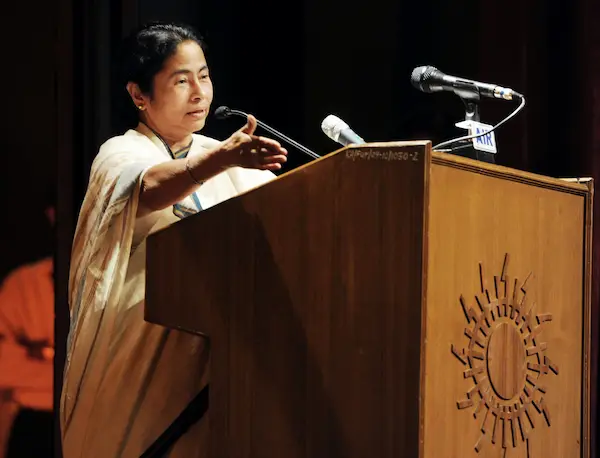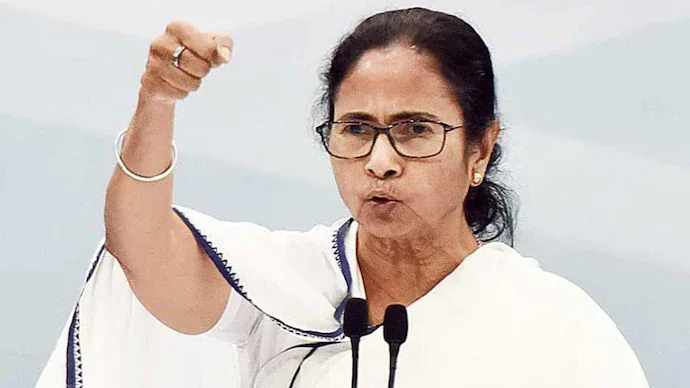Mamata Banerjee (Bengali: মমতা বন্দ্যোপাধ্যায়) is a politician from India. She is currently the Chief Minister of West Bengal, a state in eastern India. Banerjee is the founder and chairperson of the All India Trinamool Congress (AITMC or TMC), a regional political party in West Bengal. She is also a Member of the Legislative Assembly (MLA) for the constituency of Nandigram.
Banerjee previously served as the Minister of Railways in the Government of India and as the Minister of Coal and Minister of Human Resource Development. She has been an MP for several terms from the state of West Bengal.
Banerjee is known for her populist policies and her opposition to the Communist Party of India (Marxist), which previously held power in West Bengal for many years. She is also known for her strong stand on various issues such as farmers’ rights, women’s safety and education.
She is regarded as one of the most powerful women in India, as well as one of the most powerful women in Bengal politics.

Early life and education
Mamata Banerjee was born on 5 January 1955 to a Bengali Hindu Brahmin family. She was the youngest of five children born to Promileswar Banerjee and Gayetri Devi. Banerjee’s family was not well off, and her father worked as a clerk in the government. Despite this, Banerjee was a bright student, and she completed her early education in Kolkata. She graduated with honours in history from the University of Calcutta.
Because her father died when she was only a teenager, Banerjee became responsible for her entire household at an early age. An NPR feature on the Indian prime minister shows that she juggled quite a few odd jobs as a result. To help make ends meet, Banerjee took on jobs ranging from working at milk booths to tutoring schoolchildren.
Despite these responsibilities, with Banerjee’s wit and passion, she secured a spot to study history and law at the University of Calcutta. During her university years, she first got involved in student politics. In between attending demonstrations and establishing Chhatra Parishad Unions (the student wing of the Congress Party), Banerjee managed to draw the attention of local leaders from India’s previous dominant political party, Indira Gandhi’s Indian National Congress. From here, she soon pursued politics as a profession.
Political career
Mamata Banerjee’s political career has often been described as an illustrious one. Banerjee started her political career at a young age. She began by participating in student politics and social activism, during which time she came in contact with several leaders of the Communist Party of India (Marxist) or CPI(M). She was known for her fierce speaking style and her commitment to social and political causes.
After completing her education, Banerjee began working as a school teacher and later as a clerk at the state secretariat in Kolkata. In 1971, at the age of 26, she became one of the youngest women to ever be elected to the West Bengal Legislative Assembly.
In 1975, she became a force to be reckoned with when she danced on top of politician Jayaprakash Narayan’s car in an act of protest. However, it was in 1984 that Banerjee was elected to India’s parliament as a member of the Congress Party. She went on to serve multiple terms as a Member of Parliament (MP) and held several cabinet portfolios in the government of India, including Railways and Coal. In 1988, after a fallout with Congress leaders, she created her own political party—a centre-left one which focused primarily on West Bengal.
In 1991, prime minister P.V. Narasimha Rao appointed her as the Union Minister of State for Human Resources Development, Youth Affairs and Sports, and Women and Child Development. She became the first female minister of railways in 1999, which was a position she resigned from a year later to protest against the hike in petroleum prices.
In 2011, Banerjee led the All India Trinamool Congress (AITMC) to victory in the West Bengal state assembly elections, and she became the first woman to be elected Chief Minister of West Bengal, a position she continues to hold till present.
As West Bengal’s first female chief minister
In 2011 came Banerjee’s most critical political victory. Banerjee was elected as West Bengal’s first female chief minister, which simultaneously marked the end of a 34-year Communist rule in the state. She then created numerous reforms in the health and education sector, including quicker pensions for retiring teachers and enhanced health facilities and services.
Since starting her third term as chief minister in 2021, Banerjee has launched several schemes, such as the Laskhmir Bhandar, which provides women under the age of 60 with basic financial help. Projects and welfare programs such as these are the reason why the chief minister has a strong appeal among women. An essay by The New York Times on the 2021 elections explains that most female voters in West Bengal, which comprised 49% of the state’s electorate, voted for Banerjee due to her beliefs and actions against misogynistic politics.
She is also responsible for the construction of numerous roads, including the Kona Expressway, the longest expressway in India. She also re-introduced the Maitree Express, a train that travels between Kolkata and Dhaka. She was successful in fighting for the rights of farmers in her state, allowing them to receive fair compensation for the products they sell. She also introduced a unique initiative called the “Mondal Swasthya Scheme” that allowed rural people to get free medical treatment. She introduced a program that allows poor women to receive free medical treatment and free equipment for hearing problems. She also introduced a program that allows children from poor families to receive free education. She introduced a program that partners with private organizations to provide affordable housing for the poor in West Bengal.
Mamata Banerjee is known for several notable accomplishments and initiatives during her tenure as the Chief Minister of West Bengal. Some of her most notable work includes:
- Land reforms: Banerjee’s government has implemented a number of land reform measures, including the return of land to farmers who were previously dispossessed, and the distribution of land to landless farmers.
- Industry and business development: Banerjee’s government has made efforts to attract investment and spur economic growth in the state. She has launched several policies and initiatives to develop small and medium enterprises (SMEs) and the micro, small, and medium enterprises (MSME) sector.
- Infrastructure development: She has initiated a number of infrastructure projects such as the construction of flyovers, expressways, and a metro rail system in Kolkata, the capital of West Bengal.
- Rural development: Banerjee’s government has implemented several schemes to improve the standard of living in rural areas. She has also initiated several schemes for the welfare of the farmers and to improve agricultural practices and development
- Education and health care: Banerjee’s government has implemented several policies to improve the education and health care systems in the state. She has taken several initiatives to improve the quality of primary and secondary education and to provide free healthcare services to the citizens of the state.
- Empowering women and minorities: Banerjee’s government has implemented a number of policies and schemes to empower women and minorities, and to protect their rights. She has also taken initiative to provide education to the girl child and to improve the safety and security of women.
A vocal critic and an unapologetic personality
Mamata Banerjee has had a significant impact on Indian politics, particularly on West Bengal and the state’s relationship with the central government. She has been known to be a vocal critic of the Indian National Congress, the BJP, and Prime Minister Narendra Modi. She has gone on record to openly state that she does not believe in the BJP’s vision for India. She has also openly criticized the economic policies of the central government, particularly demonetization and GST, which she believes are detrimental to the growth of the Indian economy. She has also spoken out against the way the BJP has been handling relations with West Bengal and has accused the party of attempting to interfere with the state’s culture and political systems. She has also criticized the BJP for being undemocratic and for violating the federal structure of the Indian government.
Personal life and achievements
Mamata Banerjee’s personal life has been surrounded by controversy and much attention. She is twice divorced. She was married to Dr Ashok Banerjee for 10 years and had two children with him. Her first marriage ended in divorce in 1991. She then married Dr Siddhartha Mukherjee in 1992. However, this marriage only lasted seven years before they divorced in 1999. In 2006, she was engaged to a businessman, Shyam Bal Bajaj, but they never married. Bajaj died in 2017. In 2010, she had a well-publicized affair with a railway contractor, Mukul Roy. Roy went on to become the General Secretary of the All India Trinamool Congress. He later resigned from his duties due to corruption charges against him.
Mamata Banerjee is known for her simple lifestyle, favouring white cotton saris instead of luxurious clothing. She embodies the image of an ordinary person, and as biographer Shutapa Paul states, she is associated with the image of a mother figure and an elder sister.
Interestingly, Banerjee has become somewhat of an icon. A movie titled Baghini (or “The Tigress”) was made about her life in 2019. And in 2021, she made Time’s list of 100 most influential people and was dubbed “the face of fierceness in Indian politics” for her unyielding spirit.
Controversies
Mamata Banerjee has faced controversies throughout her career. Some of the most notable controversies she has been involved in include:
- Saradha chit fund scam: A large-scale financial fraud in which investors were promised high returns on their deposits in a chit fund company, Saradha Group. Several high-ranking TMC leaders and politicians, including some members of Mamata Banerjee’s cabinet, were accused of involvement in the scam. Though Banerjee herself was not directly accused of involvement in the scam, but it has been alleged that her government didn’t take enough actions to stop the scam.
- Political violence: West Bengal has seen a rise in political violence in recent years, with clashes between TMC and opposition party workers being reported on multiple occasions. Banerjee has been criticized for not doing enough to stop the violence and for not taking action against TMC workers who were involved.
- Police reform: Banerjee’s government has been criticized for not doing enough to reform the state’s police force, which has been accused of being politicized and of failing to maintain law and order.
- Human rights: Several incidents of human rights violations have been reported in the state during her tenure, with her government and her party leaders being accused of harassment, intimidation and physical assault.
- Oppression of the media: Banerjee has been criticized for trying to control the media and for not respecting press freedom.
- Economic performance: West Bengal has been criticized for poor economic performance in recent years. Though Banerjee’s government has made efforts to attract investment and spur economic growth in the state, but there were also allegations of a lack of transparency and accountability in the process, thereby hindering potential investment.
Most recently, an incident during the flagging of the Vande Bharat Express at Howrah Station has incited a conflict of words between the Trinamool Congress and the Bharatiya Janata Party. In a 2022 The Hindu report titled ‘Mamata Banerjee refuses to sit on dais at railway event’, Suvendu Adhikari shared that Banerjee avoided sharing the stage with him because he’d previously defeated her in the 2021 Nandigram Assembly polls.



